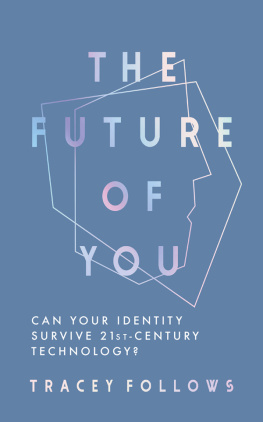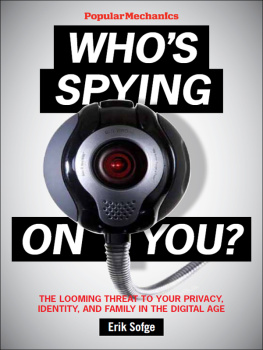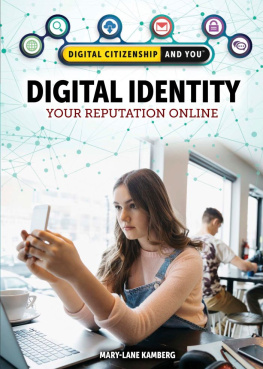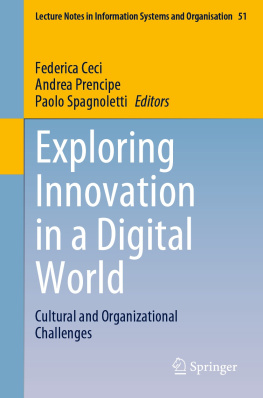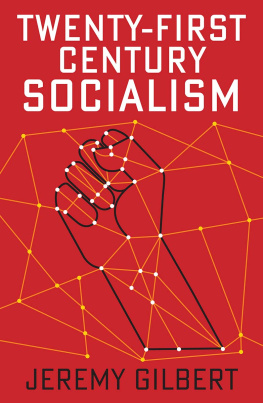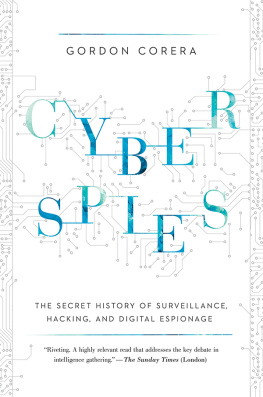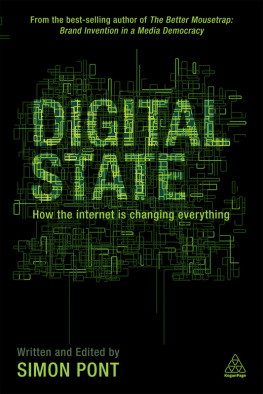Contents
Guide


To Teddy & Emelda May
CONTENTS
INTRODUCTION: DISTRIBUTING YOU
I am not who I say I am. At least, not according to Facebook. A few years ago I opened an email from Facebook that began Dear Byron. It was an email to me at my usual email address but the name of the person it was addressed to was Byron Loweth.
This continued for several weeks, with notifications from Facebook popping up to show me the latest status updates from my thirty-year-old male friends. Everyone seemed to be having a lovely time. The problem was I didnt recognise any of them. They werent my friends, they were Byrons friends. I soon suspected my Facebook had been hacked. My login details didnt seem to work so I opted to lock my account, reset my email password, and then login afresh to Facebook. But the process required that I upload some personal identification, with a range of options offered such as a driving licence or a passport. I wondered if this might be a phishing scam but having satisfied myself that it all seemed above board, I scanned in a copy of my passport, and went off to make a cup of tea while I waited for Facebook to tell me it had unlocked my account.
I returned to find a message that said my account could not be unlocked. Having scrutinised my passport, Facebook had concluded this wasnt me. Wait, what? What did they mean this wasnt me? It was my Facebook account, with photos of me all over my feed, that matched the one on my passport. If not me, who did they think I was?
To this day, I have not been able to unlock my Facebook account and I can only assume that if I have any presence on the site at all, I do so in a semi-deactivated state of social limbo. But it got me thinking. I had been asked to prove my identity in order to access a website, and I had uploaded a copy of a document designed to give me access to whole countries proof of identity that I had to carry around with me twenty-four hours a day when I lived abroad, and which you have to go to quite some trouble to replace should it be lost. But Facebook didnt recognise it, and it didnt recognise me. The automated system of a technology platform had decided that my government-issued paperwork didnt prove who I said I was and there was no human within the system to whom I could appeal.
I began to worry. If a technology platform could set itself up as the authority when it comes to verifying my identity, what else might its algorithms and those of all my other online service providers be deciding about me? If I could be told that I wasnt me, I felt like question marks could be raised over every other aspect of my existence. And I started to wonder who was in charge.
Who am I? is one of the most fundamental questions that we can ask ourselves. It seems such a simple question to pose, but philosophers have wrestled with possible answers for centuries. And they are still arguing about it today. In 2013, David Bourget from the University of Western Ontario and David Chalmers from New York University conducted a survey of the views of just under two thousand contemporary professional philosophers and found that opinion was split on the nature of personal identity. Just over a third of respondents had a psychological view of personal identity that I am who I am for as long as I remain capable of psychological processes such as thinking, believing, desiring, remembering and choosing. Just under 17 per cent had a biological view that I am who I am for as long as my body continues to exist. And 12 per cent opted for the so-called further-fact view that who I am depends on more than my continued psychological and biological existence. And the rest backed various other unspecified theories.
If eminent philosophers cant agree on a universal theory of personal identity, then I am certainly not going to venture one. This book is not going to offer a philosophical analysis of identity; there are plenty of very good reads on that from philosophers past and present. Nor is it going to be about identity in the sense of identity politics the way in which people choose to identify themselves in all sorts of different ways that have become increasingly politicised such as nationality, race and gender. There is plenty to be said about movements such as #metoo and #blacklivesmatter indeed, the media seem to cover them 24/7 but they revolve around quite a narrow view of identity as something associated solely with the colour of our skin, our gender, class or sexuality. The kind of identity that I want to talk about is a far broader, richer concept.
I believe that the notion of identity has become more important than ever thanks to the disruptive effect of technology. After my experience with Facebook, it has dawned on me that a significant shift is taking place. In the past I always assumed that I had control over my own identity via my state-issued credentials that they represented a mutually agreed proof of identity between myself and the state. And to a large extent that was true. Years ago, what you considered to be you existed almost entirely in the analogue world. There were certain key documents and information linked to your identity held by the government and a few other official institutions such as your bank. But mostly what defined you as you existed in the real world, under your control your photographs, your receipts, your physical body, your work, your interactions with others. Over the last twenty years or so, however, with the rise of technology platforms like Facebook, we live much more of our lives online, relying on machines to verify, authenticate, validate and connect us under their terms of service rather than ours. It makes me wonder if we are in danger of losing control over who we are.
In this digital, data-driven, internet-connected world that we now find ourselves in, our identity has become distributed throughout a network of online sign-ins and subscriptions, through social platforms and work productivity apps, through online bank accounts and shopping carts that hold our credit card details, and through office entry systems that can verify who we are from the sound of our voice or a quick scan of our face. The interconnectivity of the digital world has great benefits; people can share ideas, collaborate on projects and learn from each other much more easily, and the more connected we are, the more innovative we are. But equally, the more connected we are, the more vulnerable we are. Now that our identities are distributed across the web, more people can gain access to our personal information, views, contacts and ideas, which has helped to drive an increase in identity fraud. In fact, synthetic identity fraud the blending of real and fake information to invent a person who can access services and then disappear is one of todays fastest growing forms of fraud.
Technology has caused us to think differently about who we are. The proliferation of social media platforms has given us greater opportunity to shape and share our personal identity. But they have also made it possible for us to present different personas via different media and distribute our self. In January 2020 a hugely successful meme was born when the country singer Dolly Parton was invited to take part in what became known as the social media challenge, creating a grid of four photographs that would make perfect profile pictures for LinkedIn, Facebook, Instagram and Tinder accounts. Each of the images she uploaded for the challenge were quite distinct from each other: LinkedIn Dolly is pictured looking serious and professional in a work suit and an updo; Facebook Dolly is shown wearing a friendly girl-next-door Christmas sweater; Instagram Dolly is depicted in arty black and white, wearing a pair of jeans and carrying her guitar; and Tinder Dolly is dressed in a playboy bunny outfit what else? And underneath the grid of images, she had written: Get you a woman who can do it all!

